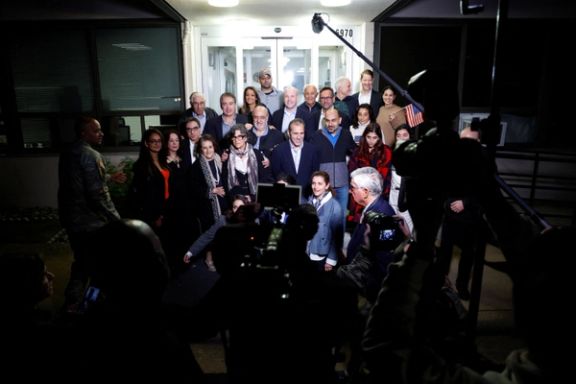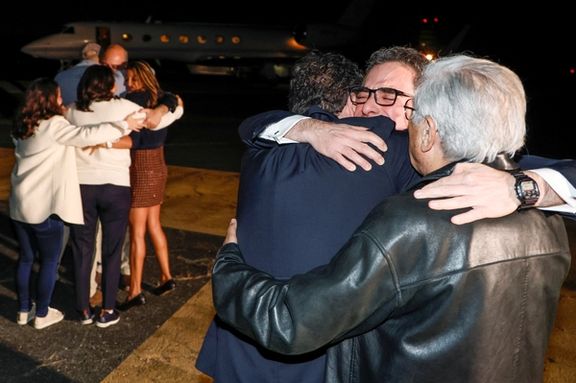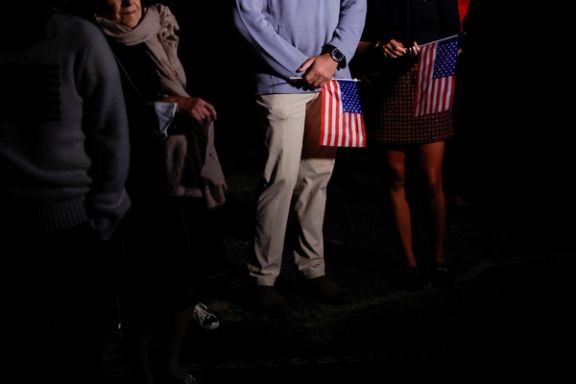Five American Hostages Arrive Home, Ending ‘Nightmare’

Five Americans held hostage in Iran arrived in the United States Tuesday, one day after $6 billion in frozen Iranian oil revenues was transferred to banks in Qatar.

Five Americans held hostage in Iran arrived in the United States Tuesday, one day after $6 billion in frozen Iranian oil revenues was transferred to banks in Qatar.
They made an emotional return, ending their imprisonment "nightmare", after being arrested, falsely accused of espionage and convicted in sham trials without due process of law.
Coming off the plane, the returning Americans were embraced by family and friends with smiles, laughs, and visible emotion, video footage from the airport showed. One of the returnees briefly waved a small Stars and Stripes handed to him.
"The nightmare is finally over," said Babak Namazi, speaking with his arm around his returning brother Siamak at Fort Belvoir, Virginia.

As part of the deal, five Iranians charged or convicted of non-violent crimes were also freed by the US. Only two of the five chose to return to Iran and were handed to the Iranian officials in Doha airport when the five Americans landed there.
Siamak Namazi, one of the freed Americans, issued a statement immediately after leaving Iran, in which he praised President Biden and his administration for making ‘incredibly difficult decisions’ to secure his release.
“Thank you... for ultimately putting the lives of American citizens above politics,” Namazi said in his statement.
Not everyone was so thankful, however.
Gazelle Sharmahd, whose father Jimmy, another American, was kidnapped and is on death row in Iran, issued a press release almost at the same time as Namazi.
“How does it make sense to leave hostages behind,” Sharmahd writes, “especially the only US hostage who does not hold an Iranian passport, who did not travel to Iran but was kidnapped, who was NOT sympathetic to the hostage takers…”
Addressing President Biden, she continued, “instead of wasting your time on national TV trying to convince us that our hostage takers will use the money for humanitarian reasons, explain to us how and when will you bring Jimmy Sharmahd back home to us?”
The Biden administration came under attack also from many prominent Republicans in the Capitol.
Michael McCaul, Chairman of the House Foreign Relations Committee, slammed those who have negotiated the prisoner swap on Fox News: “They are so naive... It was a hostage swap for $6 billion... It's going to go into terror proxy operations, it's going to go into building their nuclear...offensive system for a nuclear war."
Republican congressman Mike Turner was another vocal critic of the deal. Appearing on CBS, he warned of the future risks involved. “Whenever you put a price on American heads, you get an incentive for people to take more hostages.”
The exchange at the Doha airport –reminiscent of Cold-War exchanges between the US and the Soviet Union– was timed to perfection for the Islamic Republic. The hostages left Iran immediately after the anniversary of the killing of Mahsa Amini, and just as Raisi arrived in New York for the UN General Assembly.
The plight of the freed Americans is now bound to dominate airtime, diverting attention from Raisi and his regime’s brutal crackdown of every dissenting voice.
“I'm heading to New York… to tell the world not to legitimize murderous dictators like Iranian president Ebrahim Raisi,” wrote Hillel Neuer, an international human rights lawyer and the executive director of United Nations Watch.
Raisi was a member of the infamous Death Committee which oversaw summary execution of at least two thousand Iranian political prisoners in 1988.
